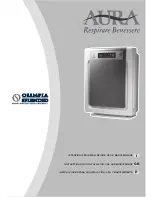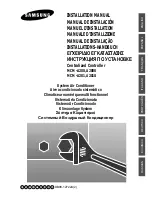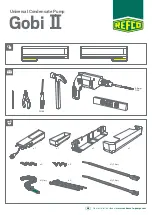
66399-YIM-C-0405
62
Unitary Products Group
COOLING SEQUENCE OF OPERATION
CONTINUOUS BLOWER
By setting the room thermostat fan switch to “ON,” the
supply air blower will operate continuously.
INTERMITTENT BLOWER
With the room thermostat fan switch set to “AUTO” and
the system switch set to either the “AUTO” or “HEAT”
settings, the blower is energized whenever a cooling or
heating operation is requested. The blower is ener-
gized after any specified delay associated with the
operation.
When energized, the indoor blower has a minimum run
time of 30 seconds. Additionally, the indoor blower has
a delay of 10 seconds between operations.
NO OUTDOOR AIR OPTIONS
When the thermostat calls for cooling, the low-voltage
control circuit from “R” to “Y1” and “G” is completed.
The compressor and condenser fan motor are ener-
gized. After completing the specified fan on delay for
cooling, the UCB will energize the blower motor.
Once the thermostat has been satisfied, it will de-ener-
gize Y1. If the compressor has satisfied its minimum
run time, the compressor and condenser fan de-ener-
gize. Otherwise, the unit operates the cooling system
until the minimum run time for the compressor has
been completed. After the compressor de-energizes,
the blower is stopped following the elapse of the fan off
delay for cooling.
To be available, a compressor must not be locked-out
due to a high or low-pressure switch or freezestat trip
and the anti-short cycle delay (ASCD) must have
elapsed.
ECONOMIZER WITH SINGLE ENTHALPY SENSOR
When the room thermostat calls for cooling, the low
voltage control circuit from “R” to “G” and “Y1” is com-
pleted. The UCB energizes the blower motor (if the fan
switch on the room thermostat is set in the “AUTO”
position) and drives the economizer dampers from fully
closed to their minimum position. If the enthalpy of the
outdoor air is below the setpoint of the enthalpy con-
troller (previously determined), “Y1” energizes the
economizer. The dampers will modulate to maintain a
constant supply air temperature as monitored by the
discharge air sensor. If the outdoor air enthalpy is
above the setpoint, “Y1” energizes the compressor and
condenser fan motor only.
Once the thermostat has been satisfied, it will de-ener-
gize “Y1”. If the compressor has satisfied its minimum
run time, the compressor and condenser fan are de-
energized. Otherwise, the unit operates the cooling
system until the minimum run times for the compressor
has been completed. After the compressor de-ener-
gizes, the blower is stopped following the elapse of the
fan off delay for cooling, and the economizer damper
goes to the closed position. If the unit is in continues
fan operation the economizer damper goes to the min.
position.
ECONOMIZER WITH DUAL ENTHALPY SENSORS
The operation with the dual enthalpy sensors is identi-
cal to the single sensor except that a second enthalpy
sensor is mounted in the return air. This return air sen-
sor allows the economizer to choose between outdoor
air and return air, whichever has the lowest enthalpy
value, to provide maximum operating efficiency.
ECONOMIZER (SINGLE OR DUAL) WITH POWER
EXHAUST
This system operates as specified above with one
addition. The power exhaust motor is energized 45
seconds after the actuator position exceeds the
exhaust fan setpoint on the economizer control. When
the power exhaust is operating, the second stage of
mechanical cooling will not operate. As always, the “R”
to “G” connection provides minimum position but does
not provide power exhaust operation.
MOTORIZED OUTDOOR AIR DAMPERS
This system operation is the same as the units with no
outdoor air options with one exception. When the “R” to
“G” circuit is complete, the motorized damper drives
open to a position set by the thumbnail on the damper
motor. When the “R” to “G” circuit is opened, the
damper spring returns fully closed.
COOLING OPERATION ERRORS
Each cooling system is monitored for operation outside
of the intended parameters. Errors are handled as
described below. All system errors override minimum
run times for compressors.















































